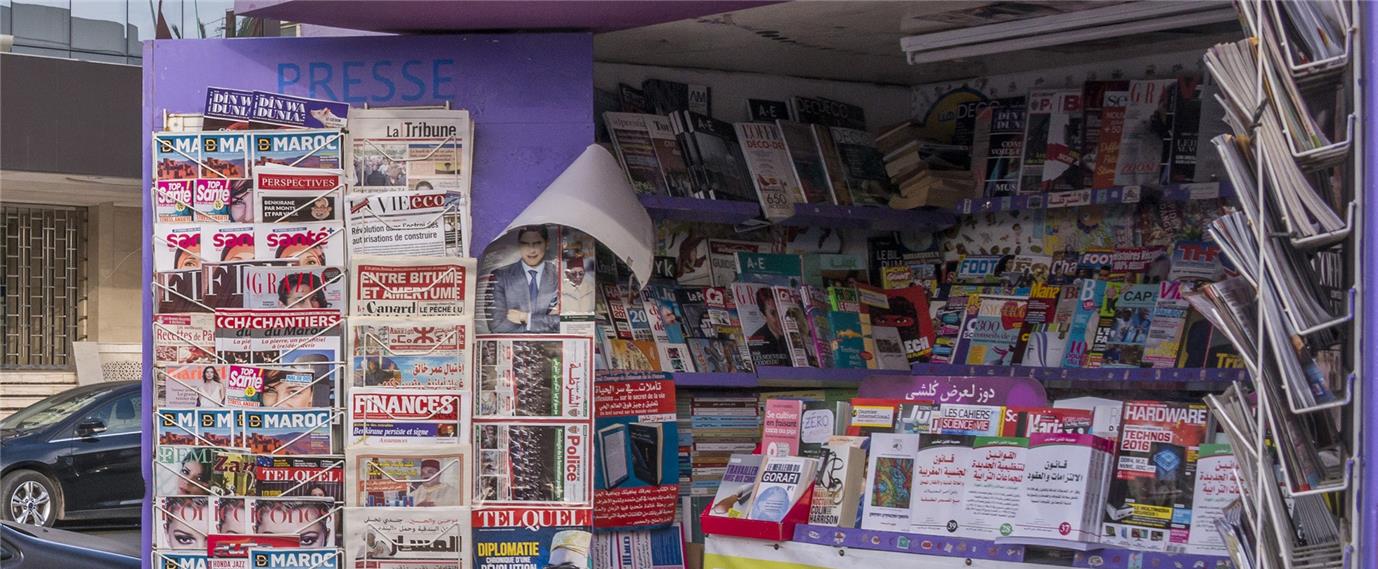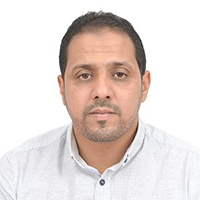عرف المشهد السياسي المغربي العديد من التغيرات الجوهرية والتطورات المتسارعة خلال أكتوبر/تشرين الأول 2017، عقب ماجاء في خطاب الملك المغربي محمد السادس في سياق افتتاح السنة البرلمانية الجديدة. وحمل هذا الخطاب إشارات واضحة إلى ضرورة محاربة كل أشكال الفساد واستغلال السلطة لتحقيق مآرب شخصية وتفعيل المبدأ الدستوري الرابط بين المسؤولية والمحاسبة.
أيام قليلة بعد الخطاب الملكي، تفاجأ الرأي العام المغربي ببلاغ للديوان الملكي يصرح بإعفاء الملك عددا من الوزراء والمسؤولين الحكوميين ومسؤولي الإدارة الترابية (وزارة الداخلية)، بعد ثبوت تورطهم -حسب تقرير صادر عن المجلس الأعلى للحسابات- في تأخير إنجاز مشاريع "منارة المتوسط"(1)، وهو يمثل سببا مباشرا من أسباب تزايد رقعة احتجاجات ساكنة الحسيمة -المدينة المتواجدة بمنطقة الريف- في تلك الفترة.
لم تخرج تغطية الإعلام العمومي المغربي لهذه التطورات عن سياق عمله الروتيني الخاضع لسيف السلطة، باعتبار أن الإعلام العمومي في المغرب يتبع الشركة الوطنية للإذاعة والتلفزة المغربية، وتمتلك الدولة الحصة الأكبر في أسهم الشركة، وبالتالي يتعين على العاملين بهذه المؤسسات الالتزام بنظرة حارس البوابة أو بالرؤية الرسمية للأخبار والأحداث ومجمل ما يمور من تغييرات في المشهد السياسي والاجتماعي والاقتصادي داخل المملكة.
وقد عمدت قنوات القطب العمومي -خصوصا القناة الأولى وقناة 2 M- إلى جعل أخبار منطقة الحسيمة في مستهل نشراتها الإخبارية اليومية، لكن من دون الغوص في خبايا الأمور وتعرية الواقع، وأعملت -بدلا من ذلك- على توجيه المتلقي نحو التركيز على المجهودات المبذولة من طرف الحكومة لتنمية المنطقة وإخراجها من دائرة التهميش والفقر.

سلة قرارات الإعفاء ومحاسبة المسؤولين لم تتوقف عند هذا الحد، بل لا تزال التقارير الصادرة عن المجلس الأعلى للحسابات بخصوص عمل المجالس المنتخبة في المحافظات والجماعات المحلية بالمملكة تحصد مزيدا من الرؤوس وتزكي نوعية القرار الديمقراطي المتخذ من أعلى سلطة في البلاد، من أجل تنظيف الحقل السياسي المغربي. لكن أين موقع الإعلام العمومي والخاص من كل ذلك؟ أليست نوعية صنع القرار الديمقراطي ترتبط ارتباطا وثيقا بنوعية الإعلام، حسب كاترين فولتمن (2)؟
تثير تلك المستجدات التساؤلات بشأن دور الإعلام كآلية للرقابة استنادا إلى نظرية صحافة الرقابة التي تعتبر أن الصحافة يتعين عليها أن تنتقد وتقيّم أداء الحكومات والمؤسسات الأخرى من أجل التأكد من أن أحدا لم يتورط في الفساد، أو يتجاوز مهام منصبه.
واعتبارا لأهمية صحافة التحقيق أو الصحافة الاستقصائية في القيام بهذا الدور، فإننا نطرح التساؤل بشأن حضور هذه الصحافة بالمغرب وتوجه الفاعلين المهنيين في المجال الإعلامي في القطاعين العام والخاص نحو ممارسة هذا الصنف من الصحافة، والعمل على القيام بدور محوري في الكشف عن قضايا الفساد، وفضح كل أشكال التحايل والتلاعب بالقانون وإهدار المال العام.
الحاجة إلى مقومات النمو
قبل عقدين من الزمن، شهدت الصحافة المغربية تطورات متلاحقة خصوصا مع بروز الصحافة المستقلة عام 1996، وتلا ذلك حرص النظام الجديد -عهد الملك محمد السادس- على توفير الأرضية القانونية لانتعاش الصحافة عبر السماح لمجموعة من الإعلاميين المستقلين بتأسيس مؤسسات إعلامية لقيت صدى لدى المتلقي المحلي الذي تجاوب مع جرعة ومنسوب زائد من الجرأة.
وتعزز ذلك التوجه بتنزيل قانون تحرير القطاع السمعي البصري -السمعي فقط في مرحلته الأولى- عام 2006، وبدأت تلوح في الأفق بوادر عمل صحفي استقصائي من خلال تجربة مجلة "تيل كيل" وتناولها لمواضيع حساسة بنفس استقصائي؛ إذ سبق أن أعدت تلك المجلة تحقيقات صحفية حول مواضيع كانت تعد خطوطا حمراء في المغرب، مثل التحقيق الذي نشرته بخصوص النشاط التجاري لأفراد من الأسرة المالكة. لكن هذه التجربة لم تدم بعد توقيف مجموعة من المنابر الإعلامية التي استطاعت أن تثبت قدمها في المشهد الإعلامي المغربي.
هناك بعض المحاولات الاستقصائية من خلال برامج التحقيق بقنوات القطب العمومي (الشركة الوطنية للإذاعة والتلفزة المغربية) مثل برنامج "تحقيق" بقناة M2 وبرنامج "45 دقيقة" بالقناة الأولى وبرنامج "المحققون" بقناة "ميدي1". بيد أن كل تلك البرامج تركز على القضايا ذات الطابع الاجتماعي، ولا تغوص بشكل أعمق في القضايا الحساسة التي باتت ضمن خانة المقدسات والثوابت، من قبيل قضايا الفساد التي تطال كبار المسؤولين.
وفي الآونة الأخيرة، أسس الإعلامي رشيد نيني -المعروف بجرأة قلمه في طرح ومناقشة التابوهات في مقالاته خلال مسيرته الصحفية- قناة "تيلي ماروك"، وهي قناة خاصة تبث من إسبانيا، وتقدم فيها الإعلامية غزلان أنوار برنامجا خاصا بصنف التحقيق "طابو"، بيد أنها تشتغل وفق خط التماس ذاته من دون الغوص في ملفات تمس "الثوابت" أو المؤسسات التي لا يطالها النقد، من قبيل المؤسسة الملكية ومؤسسة الجيش و"أصحاب الحظوة" القريبين من صنع القرار السياسي.
ورغم محاولات التأسيس هذه لصحافة استقصائية بالمغرب، فإن إبراهيم الشعبي الباحث في الإعلام والاتصال والمدير الجهوي لوزارة الاتصال بطنجة يرى أن "الصحافة الاستقصائية في بلدنا، التي تعتبر عصب مهنة المتاعب، ما زالت محتشمة في مختلف وسائل الإعلام محليا، رغم أن لها أهمية محورية في الكشف عن الحقائق في قضايا تهم الشأن العام الوطني، سواء أكانت هذه القضايا سياسية أو اجتماعية أو اقتصادية؛ لأن الصحفي المحقق لا يكتفي بنشر الخبر، بل يتجاوزه إلى استنطاق الأحداث والفاعلين المباشرين فيه".
بدوره يذهب حسن اليوسفي المغاري الكاتب العام للمعهد العالي للإعلام والاتصال بالدار البيضاء، إلى أبعد من ذلك حين يقر بأن "جنس التحقيق الصحفي يكاد يكون منعدما بالمغرب، وهناك خلط ملحوظ يقع فيه العديد من الإعلاميين المحليين لكونهم لا يفرقون بين جنس التحقيق الصحفي وجنس الربورتاج". ويضيف أنه "من المستبعد في الوقت الحالي توفر صحافة استقصائية في المغرب تضاهي مثيلاتها بالدول الغربية؛ تبحث في قضايا فساد عالمية وعابرة للحدود مثل تحقيق وثائق بنما".
لذلك يقترح اليوسفي أن يعمل الإعلاميون المغاربة من ذوي الخبرة والباع الطويل في مجال الصحافة على اختلاف أجناسها؛ على تطوير مهاراتهم في صنف الصحافة الاستقصائية، والتزود من معين ذوي الاختصاص على المستوى الإقليمي والدولي من أجل إشراك معارفهم مع الإعلاميين الشباب الراغبين في ولوج عالم الصحافة الاستقصائية الذي -حسب رأيه- يتطلب مهارات عدة، في إشارة إلى واقع تدريس هذا الصنف في المعاهد والمؤسسات المختصة بالمملكة، بحيث يؤكد اليوسفي على أهمية توفر الطاقات المتخصصة من أجل تسهيل تدريس الصحافة الاستقصائية، خصوصا أنه ليس هناك مقرر خاص بها في المؤسسات والمعاهد المختصة بالإعلام والصحافة أو بوحدات الدراسات العليا في المؤسسات الجامعية.
عقبات في طريق التأسيس
ينطلق عمل الصحفي الاستقصائي من المعلومة، ولا يكتمل عمله إلا بالحصول على قدر أكبر من المعلومات لتعزيز فرضيته والتحقق منها والوصول إلى النتائج المتوخاة بشكل علمي دقيق. ورغم أن الدستور المغربي ينص في الفقرة الثانية من الفصل 27 على حق الحصول على المعلومة، فإن ذلك يقيّد بمجموعة من الالتزامات والتقييدات. في المادة السادسة من قانون الصحافة والنشر يشار إلى أنه "يحق للصحفيات والصحفيين ولهيئات ومؤسسات الصحافة الولوج إلى مصادر الخبر والحصول على المعلومات من مختلف المصادر، باستثناء المعلومات التي تكتسي طابع السرية.. إلخ". وعبَّر اليوسفي عن استغرابه بشأن استمرار النقاش حول قانون الحصول على المعلومة وتأخر تنزيل القانون التنظيمي، وهو الذي يكفل وضع النقاط على الحروف وتوضيح كيفية الحصول على المعلومة بشكل قانوني من دون توظيف مصطلحات فضفاضة وغامضة تترك مجالا للمشرع للتأويل والاجتهاد.
إشكالية أخرى تخص استقلالية الإعلام في المغرب ترتبط بمسألة التمويل، حيث ينص قانون الصحافة والنشر على ضرورة توفير الدعم من قبل الجهات المختصة والمتدخلة في القطاع للمؤسسات الإعلامية على اختلاف أجناسها وفق شروط ومعايير محددة. وتكفي الإشارة هنا إلى أن الوزارة الوصية -وزارة الاتصال– تقدم دعما سنويا للصحف والجرائد الورقية وكذلك الإلكترونية وفق العقد/البرنامج. ويشترط في هذه المنابر التوفر على الخضوع للشروط والضوابط المنظمة لهذه العملية. كما أن قانون الصحافة والنشر يقنن بشكل كبير حصول المؤسسات الإعلامية الخاصة على الدعم الأجنبي ومصادر التمويل الخارجية، وهنا تبرز معضلة ظهور صحافة استقصائية مهنية في المغرب، باعتبار أن ذلك يتطلب صحافة مستقلة لا تأبه بالخطوط الحمراء ولا تخضع لسيف السلطة. وحتى في حال توفر ممول من القطاع الخاص، فإنه لن يغامر بالسماح لإعداد تحقيقات استقصائية يمكن أن تسبب له مشاكل يجد أنه في غنى عنها، ويُحتمل أن تُحدث له صراعات وعلاقات متوترة مع أشخاص نافذين في البلاد، أو مع السلطة السياسية ذاتها.
تكلفة الصحافة الاستقصائية أغلى من باقي الأجناس الصحفية الأخرى، ويفترض في الصحفي الاستقصائي الحصول على التمويل الكافي لإنجازها.
تفاؤل حذر
ثمة مستجدات طرأت على مستوى المشهدين السياسي والإعلامي في الفترة الأخيرة، فقد بادرت أعلى سلطة في البلاد إلى التعبير عن نيتها تفعيل المبدأ الدستوري بشأن ربط المسؤولية والمحاسبة بشكل صارم يأخذ بعين الاعتبار معاقبة من يثبت تورطهم في قضايا فساد أو اختلاس أو إهدار المال العام. ولن ندخل في تفاصيل الشكوك التي حامت حول خلفيات ومبررات هذه القرارات من طرف متتبعين ومهتمين بالشأن السياسي المغربي بحجة أن سلسلة الإعفاءات والإقالات استهدفت أطرافا وأحزابا بذاتها، بيد أنه لا بد من الإشارة إلى تفاعل الرأي العام والمواطن العادي مع هذه القرارات التي رأى فيها بارقة أمل تلوح في الأفق.
هوامش
1- أعطى الملك محمد السادس الانطلاقة لبرنامج "الحسيمة منارة المتوسط" يوم 17 أكتوبر/تشرين الأول 2015، وهو برنامج خصصت له اعتمادات مالية تفوق 6.5 مليارات درهم، على أن يتم الانتهاء من إنجاز مشاريعه التي تهدف إلى تحقيق التنمية المجالية بإقليم الحسيمة خلال العام 2019. ويهدف هذا البرنامج إلى تنمية الوسطين الحضري والقروي للإقليم، كما يقوم على خمسة محاور أساسية هي: التأهيل الترابي، والنهوض بالمجال الاجتماعي، وحماية البيئة وتدبير المخاطر، وتقوية البنيات التحتية، إلى جانب تأهيل المجال الديني.
2- Bullets and Bulletins Media and Politics in the wake of the Arab uprising, part1 (Fatima Elissawi :a comparative analysis of traditional media industry transitions in Tunisia , Lybia , and Egypt , Mohamed Zayani and Suzi Mirgani (eds) 2016








































